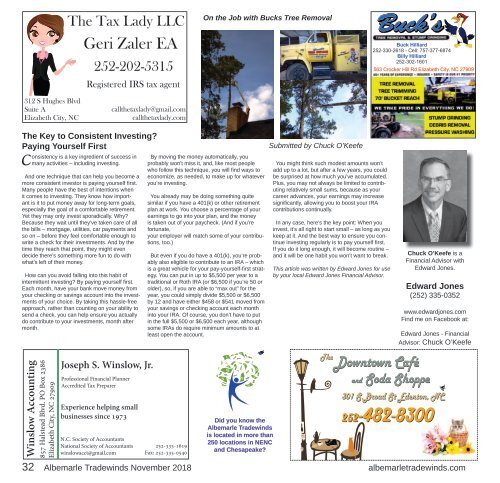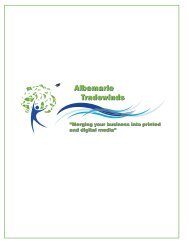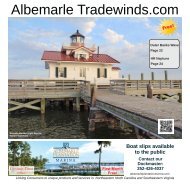Tradewinds November 2018 Web Opt
Albemarle Tradewinds November 2018 is now online. Look for the printed edition later in the week at your favorite location
Albemarle Tradewinds November 2018 is now online. Look for the printed edition later in the week at your favorite location
You also want an ePaper? Increase the reach of your titles
YUMPU automatically turns print PDFs into web optimized ePapers that Google loves.
The Tax Lady LLC<br />
Geri Zaler EA<br />
252-202-5315<br />
Registered IRS tax agent<br />
On the Job with Bucks Tree Removal<br />
Buck Hilliard<br />
252-330-2618 - Cell: 757-377-6874<br />
Billy Hilliard<br />
252-302-1601<br />
563 Crocker Hill Rd Elizabeth City, NC 27909<br />
312 S Hughes Blvd<br />
Suite A<br />
Elizabeth City, NC<br />
callthetaxlady@gmail.com<br />
callthetaxlady.com<br />
The Key to Consistent Investing?<br />
Paying Yourself First<br />
Consistency is a key ingredient of success in<br />
many activities – including investing.<br />
And one technique that can help you become a<br />
more consistent investor is paying yourself first.<br />
Many people have the best of intentions when<br />
it comes to investing. They know how important<br />
is it to put money away for long-term goals,<br />
especially the goal of a comfortable retirement.<br />
Yet they may only invest sporadically. Why?<br />
Because they wait until they’ve taken care of all<br />
the bills – mortgage, utilities, car payments and<br />
so on – before they feel comfortable enough to<br />
write a check for their investments. And by the<br />
time they reach that point, they might even<br />
decide there’s something more fun to do with<br />
what’s left of their money.<br />
How can you avoid falling into this habit of<br />
intermittent investing? By paying yourself first.<br />
Each month, have your bank move money from<br />
your checking or savings account into the investments<br />
of your choice. By taking this hassle-free<br />
approach, rather than counting on your ability to<br />
send a check, you can help ensure you actually<br />
do contribute to your investments, month after<br />
month.<br />
Winslow Accounting<br />
857 Halstead Blvd. PO Box 2386<br />
Elizabeth City, NC 27909<br />
Joseph S. Winslow, Jr.<br />
Professional Financial Planner<br />
Accredited Tax Preparer<br />
Experience helping small<br />
businesses since 1973<br />
N.C. Society of Accountants<br />
National Society of Accountants<br />
winslowacct@gmail.com<br />
By moving the money automatically, you<br />
probably won’t miss it, and, like most people<br />
who follow this technique, you will find ways to<br />
economize, as needed, to make up for whatever<br />
you’re investing.<br />
You already may be doing something quite<br />
similar if you have a 401(k) or other retirement<br />
plan at work. You choose a percentage of your<br />
earnings to go into your plan, and the money<br />
is taken out of your paycheck. (And if you’re<br />
fortunate,<br />
your employer will match some of your contributions,<br />
too.)<br />
But even if you do have a 401(k), you’re probably<br />
also eligible to contribute to an IRA – which<br />
is a great vehicle for your pay-yourself-first strategy.<br />
You can put in up to $5,500 per year to a<br />
traditional or Roth IRA (or $6,500 if you’re 50 or<br />
older), so, if you are able to “max out” for the<br />
year, you could simply divide $5,500 or $6,500<br />
by 12 and have either $458 or $541 moved from<br />
your savings or checking account each month<br />
into your IRA. Of course, you don’t have to put<br />
in the full $5,500 or $6,500 each year, although<br />
some IRAs do require minimum amounts to at<br />
least open the account.<br />
252-335-1619<br />
Fax: 252-335-0540<br />
Did you know the<br />
Albemarle <strong>Tradewinds</strong><br />
is located in more than<br />
250 locations in NENC<br />
and Chesapeake?<br />
Submitted by Chuck O’Keefe<br />
You might think such modest amounts won’t<br />
add up to a lot, but after a few years, you could<br />
be surprised at how much you’ve accumulated.<br />
Plus, you may not always be limited to contributing<br />
relatively small sums, because as your<br />
career advances, your earnings may increase<br />
significantly, allowing you to boost your IRA<br />
contributions continually.<br />
In any case, here’s the key point: When you<br />
invest, it’s all right to start small – as long as you<br />
keep at it. And the best way to ensure you continue<br />
investing regularly is to pay yourself first.<br />
If you do it long enough, it will become routine –<br />
and it will be one habit you won’t want to break.<br />
This article was written by Edward Jones for use<br />
by your local Edward Jones Financial Advisor.<br />
The Downtown Café<br />
and Soda Shoppe<br />
Chuck O’Keefe is a<br />
Financial Advisor with<br />
Edward Jones.<br />
Edward Jones<br />
(252) 335-0352<br />
www.edwardjones.com<br />
Find me on Facebook at:<br />
Edward Jones - Financial<br />
Advisor: Chuck O’Keefe<br />
301 S.Broad St Edenton, NC<br />
252-482-8300<br />
32 Albemarle <strong>Tradewinds</strong> <strong>November</strong> <strong>2018</strong> albemarletradewinds.com

















